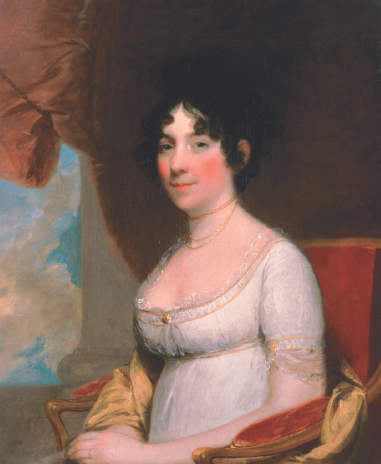Dolley Madison and Social Politics.
Printed Page 255 Chapter Chronology
Dolley Madison and Social Politics. Although women could not vote and supposedly left politics to men, the female relatives of Washington politicians took on several overtly political functions that greased the wheels of the affairs of state. They networked through dinners, balls, receptions, and the intricate custom of "calling," in which men and women paid brief visits at each other's homes. Webs of friendship and influence in turn facilitated female political lobbying. It was not uncommon for women in this social set to write letters of recommendation for men seeking government work.

When James Madison became president, Dolley Madison, called by some the "presidentress," struck a balance between queenliness and republican openness. She dressed the part in resplendent clothes, and she opened three elegant rooms in the executive mansion for a weekly open-house party called "Mrs. Madison's crush" or "squeeze." In contrast to George and Martha Washington's stiff, brief receptions, the Madisons' parties went on for hours, with scores or even hundreds of guests milling about, talking, and eating. Members of Congress, cabinet officers, distinguished guests, envoys from foreign countries, and their womenfolk attended with regularity. Mrs. Madison's weekly squeeze was an essential event for gaining political access, trading information, and establishing informal channels that would smooth the governing process.
In 1810–1811, the Madisons' house acquired its present name, the White House. The many guests experienced simultaneously the splendor of the executive mansion and the atmosphere of republicanism that made it accessible to so many. Dolley Madison, ever an enormous political asset to her rather shy husband, understood well the symbolic function of the White House to enhance the power and legitimacy of the presidency.